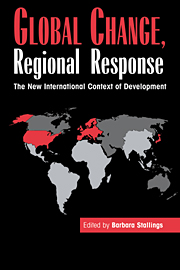Book contents
- Frontmatter
- Contents
- List of tables and figures
- List of contributors
- Acknowledgments
- Abbreviations
- 1 Introduction: global change, regional response
- Part I Global changes
- 2 The third world and the end of the cold war
- 3 Capitalisms in conflict? The United States, Europe, and Japan in the post–cold war world
- 4 Global production systems and third world development
- 5 New global financial trends: implications for development
- 6 The “triumph” of liberal economic ideas in the developing world
- Part II Regional responses
- Part III Conclusions
- Index
2 - The third world and the end of the cold war
Published online by Cambridge University Press: 05 June 2012
- Frontmatter
- Contents
- List of tables and figures
- List of contributors
- Acknowledgments
- Abbreviations
- 1 Introduction: global change, regional response
- Part I Global changes
- 2 The third world and the end of the cold war
- 3 Capitalisms in conflict? The United States, Europe, and Japan in the post–cold war world
- 4 Global production systems and third world development
- 5 New global financial trends: implications for development
- 6 The “triumph” of liberal economic ideas in the developing world
- Part II Regional responses
- Part III Conclusions
- Index
Summary
The earthquake that hit the international system at the end of the 1980s is conventionally summarized in one phrase: “the end of the cold war.” In reality, however, it involved at least four distinct elements: the end of the East–West conflict; the breakup of the Soviet Union and its alliance system; the collapse of communism as a global challenge to the West; and the triumph, in ideology if not in practice, of a political and economic model of liberal capitalism. The first three are historical processes that have important implications for the third world. The fourth is more a postulate than a reality, posing as many questions for the future of the third world as it provides answers about the end of the cold war.
The end of the East–West conflict has removed the bipolar contest that fueled most third world conflicts, when it did not generate them, and served as the framework for many North–South financial and military flows. While the end of the cold war has made great power military conflict seem less likely than at anytime in the past century, new strategic issues have emerged, born of the breakup of the USSR, with regard to the regional impact of postcommunist rivalries and to nuclear proliferation. One very important concomitant of the end of communist hegemony has been the breakup of multinational states, ending the understanding in place since 1945 whereby the existing map of the world, unjust and arbitrary as it was, should prevail.
- Type
- Chapter
- Information
- Global Change, Regional ResponseThe New International Context of Development, pp. 33 - 66Publisher: Cambridge University PressPrint publication year: 1995
- 1
- Cited by

